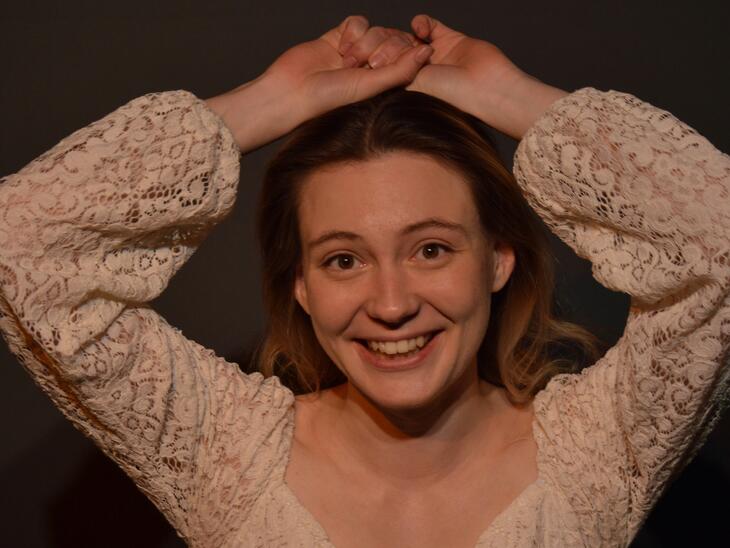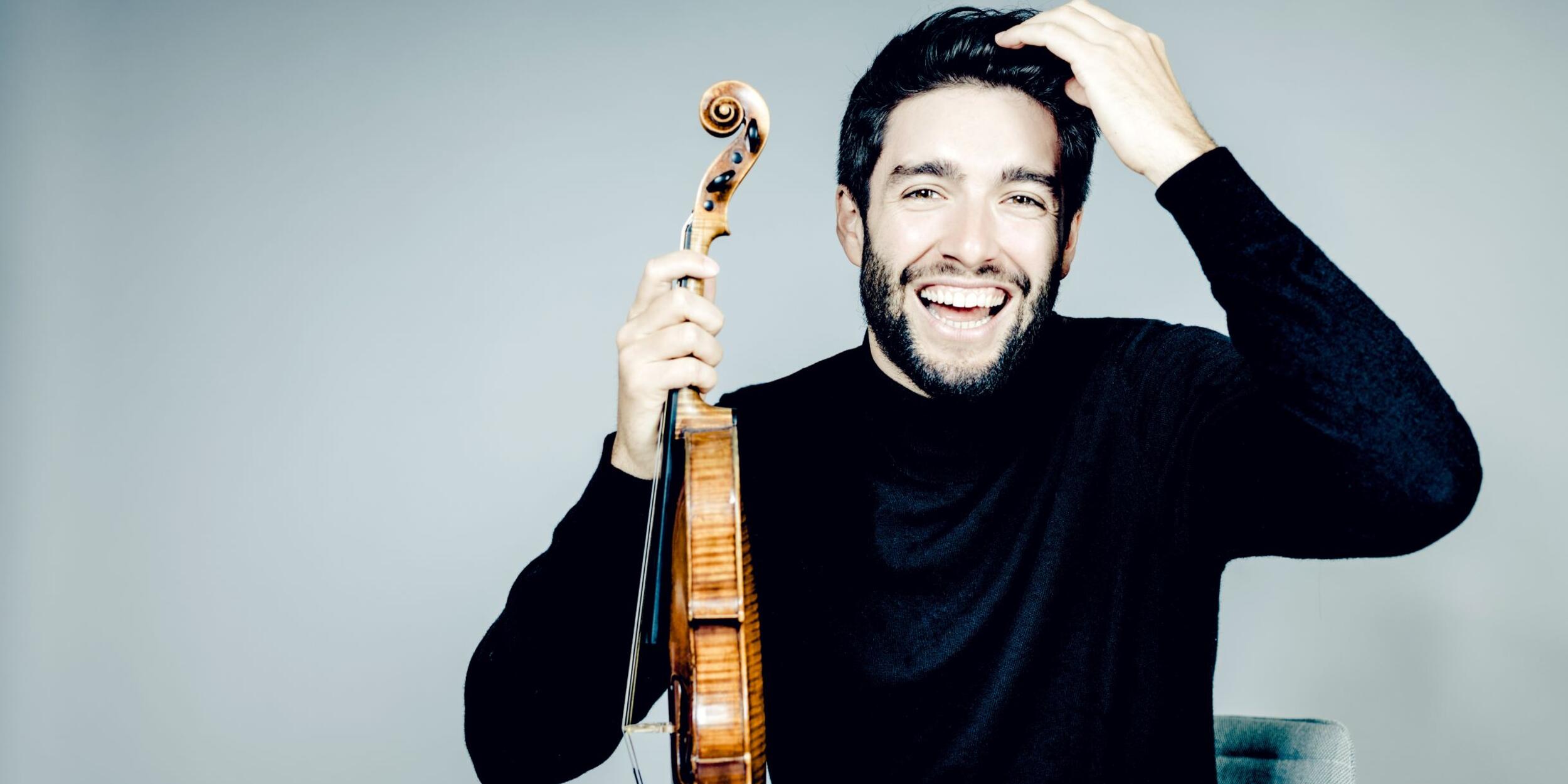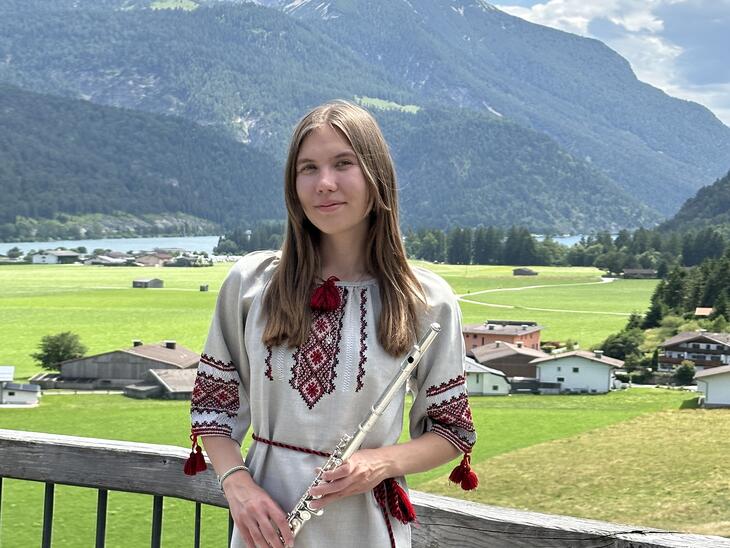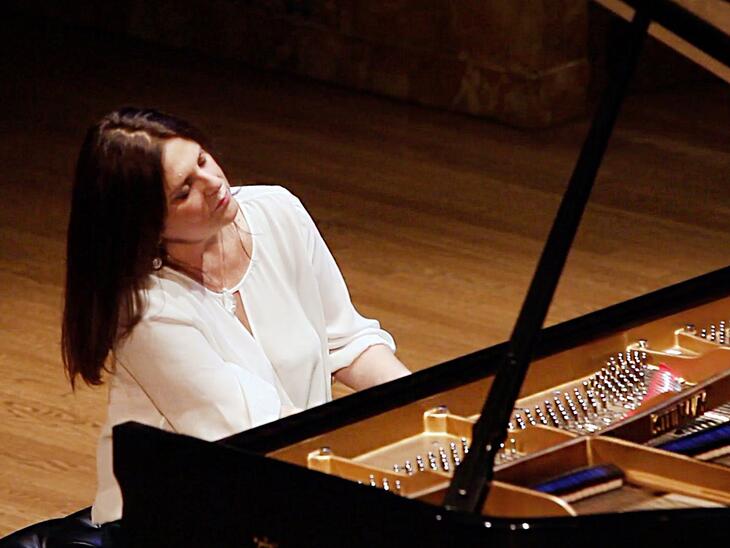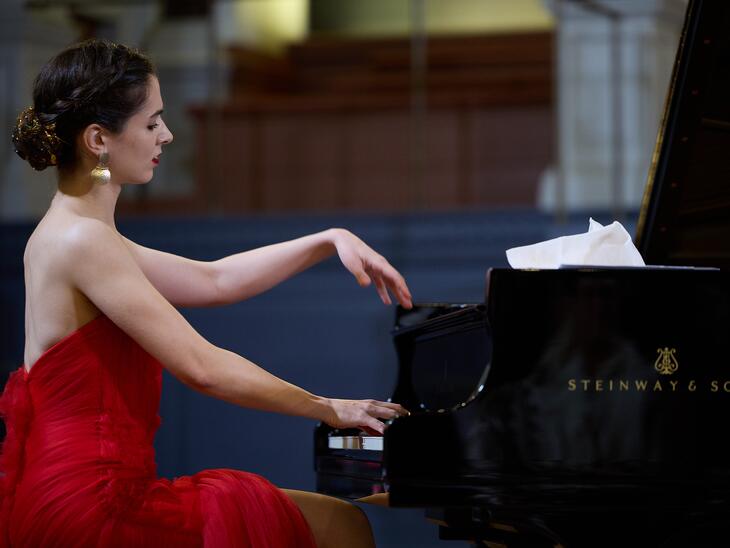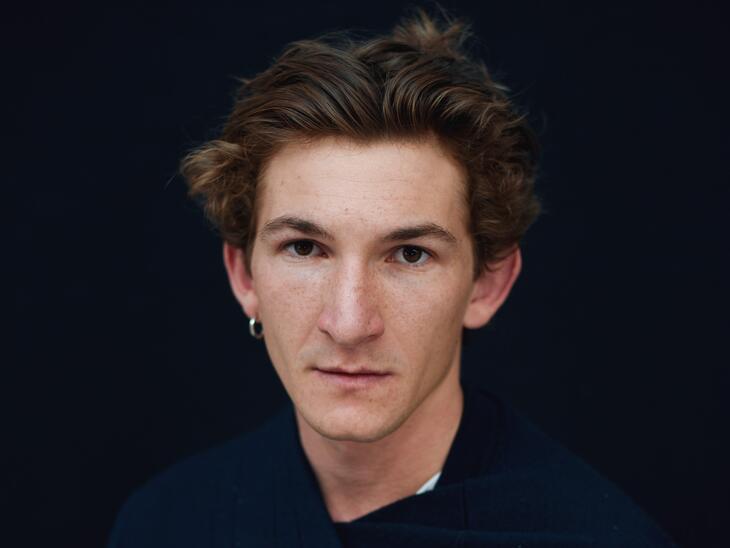You play in different formations and genres. What is so appealing about that?
From the outside, people like to perceive it that way, because I'm a classically trained violinist and tango is understood as its own genre. Personally, I don't like to separate the two. There are basically no big differences in the way we make music. So I try not to separate the genres too much and not to draw boundaries. We are musicians, what kind of music you end up making is not that important - quality is much more important.
I have a little bit of a feeling that the careers of young artists are changing compared to older ones. Many are moving into different "genres" in my perception and the terms interdisciplinarity and multimedia are popping up more and more.
Careers have changed over the years, of course. Our traditional studies have a definite framework. A course of study needs a curriculum and a structure; to some extent, there's no other way. The question is how much you can break that up. You don't have to play a Bach fugue in the first semester of your bachelor's degree. There's a lot that you should learn beforehand. It's like comparing a person who goes to driving school and instead of learning to drive, is immediately put into a Formula 1 car. But of course, students can be exposed to repertoire outside of the "standard repertoire" while still in college. There are many other composers who have written great and perhaps not so great music. One may need to learn about less great works in order to understand why music, for example by Mozart, is so grandiose. For musicians, the question is whether they want to play pieces as they did decades before, or whether they want to find something new for themselves. A voice of their own, so to speak. You can play unknown works, you can compose yourself, you can create new styles and so on. At this point I come to tango: I love this music and as a classical violinist I have the unusual advantage with tango that I can listen to the originals and get the inspiration. However, we don't want to simply copy the original. In comparison, you can't make a quick phone call to Bach today (laughs). The second exciting aspect of tango is that we want to bring this music closer to the classical audience. We don't play at tango festivals all the time, maybe once a year. Mostly we play to classical audiences who are hearing this music for the very first time. That is a great feeling. We interpret the tango and can show the audience something new. Discovering a piece for yourself in a new way is a great experience! It is different from the hundredth interpretation of a well-known piece. This is an experience I also made after my studies. For me, it's a balancing act, because the position in the orchestra is a very classical one. I wouldn't want to miss either one or the other. But everyone has to find their own way.
How does the work in the symphony orchestra differ from that of a chamber musician or in the tango quartet?
Of course, the music is very different, but in the preparation and musical practice there are actually no huge differences. One always wants to prepare in the best possible way. The obvious number of musicians is a social component. In a quartet, however, you need a different kind of initiative and organizational skills. As a freelance musician, you have to organize more: Program composition, rehearsals, performance opportunities, dates, publicity, etc. In fact, these skills are often learned much too late, when you don't need them in your studies and therefore don't practice them. The curriculum provides a lot of things. However, awareness of this should actually start earlier.
Your concert calendar includes, for example, concerts with Igor Levit and Alice Sara Ott. All of your concert partners are at the highest level. How do musicians find each other for such concerts?
It happens in different ways. Some of them are friends from their studies, and as they become better known, they are approached. Some become better known because of competitions, because they were invited to concerts. The position as concertmaster also contributes to this. That's how I got to know Igor Levit. One or two collaborations are a result of that. You get to know other musicians at festivals, for example, and over time you "know" each other in the scene. Networking is important, of course, and working with friends makes things easier. Everyone prefers to work with people they like, provided that the level fits together. Free chamber music ensembles are seldom put together by a selection process, but this happens more often with permanent ensembles.
That means you don't necessarily need an agency, right?
I personally don't have one, but I know many who do. At the end of my studies I also looked for an agency, because I was aware of the advantages of a network and agencies take care of various administrative things, among other things. I did not pursue this goal when I took up my orchestra position. My schedule is well filled with the two "mainstays" and I don't miss anything at the moment. Perhaps things would be different if I didn't have the orchestra position. Perhaps both the agency landscape and the structures in the concert business have changed. Personal responsibility is important in any case, whether with or without an agency.
Your career reads so beautifully and straightforwardly… but is it really that easy to get where you are today?
Not quite (laughs). I had my crisis of purpose during my master's studies in Berlin. I had chosen a particular teacher because I knew I could still learn a lot from him. That took a lot of patience and strength. It was really exhausting. If you want to improve things, you have to break up a lot of things and start over. At that time, I gave up engagements I had before and just practiced more. I had stopped focusing on things that were going well and just focused on what was going less well. So I felt like I couldn't play anymore. That was hard, but it was part of it and I had to go through it. I know many musicians who had a similar experience. It can happen sooner or later in the career process. The important thing is to keep going.
You have also participated in competitions. What is attractive about competitions for artists today?
I myself have played many competitions and thus always set myself goals in terms of repertoire or a deadline. As they said in Pandemic, "I don't need more time, I need a deadline" (laughs). I learned a lot through this and also met many other great musicians* from all over the world, some of whom I am still in contact with. The way to the competition was the goal, so to speak. The goal was to become better. You can't break if you don't come out the winner. You have to be aware that there are many influencing factors in a competition and not least a little luck is part of it. Above all, there are many very good musicians in the competitions. Today, winning a first prize is no guarantee of a great career. This was perhaps a little different in the past, when there were fewer competitions. A few years ago, the winners of the ARD competition still got a recording contract with Deutsche Grammophon. When I won prizes, there were concerts in the following season with orchestras, among others. In the process, I got around and was able to build up a name for myself. But that is no guarantee for a career as a soloist. Nevertheless, competitions are important, because how else do I get a stage and appropriate attention as a student? Class nights won't be enough. There are many new techniques and media now, it remains to be seen how this will develop. Nowadays, all the competitions are online, so there's also some danger in that. I don't know if I would have wanted everything to be online from the first round. Everyone has to ask themselves what their goal is with a competition and not make everything dependent on that.
What advice would you give to students when you think about your time as a student and the work process today?
There should be two sides to studying: On the one hand, you have to learn your instrument to the best of your ability and invest a lot of time. On the other hand, you have to be able to answer a few questions for yourself: What can I do differently than the generations before me? What kind of concerts do I want to play? How can I inspire the audience? You have to think about why the audience should go to your concerts. You have to invest time in that, too. This is where the difficult interplay begins. How much time do I spend on social media, recording, advertising, etc. and how much time do I invest in the music and my instrument to get better. In addition, you can't underestimate the so-called "minor subjects". You can't do it without a basis and certain basic education.
What do you remember most about your time as a student? Where could there have been a little more?
The class exchange was always very important and nice for me. In retrospect, I would have liked the importance of organizational skills to have been a topic.
Is there anything else you would like to share?
In addition to all the educational steps, you should actively think about what you want to do with music.
